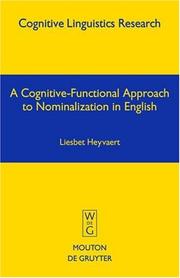| Listing 1 - 3 of 3 |
Sort by
|

ISBN: 3878082940 9783878082941 Year: 1986 Volume: 294 Publisher: Tübingen Narr
Abstract | Keywords | Export | Availability | Bookmark
 Loading...
Loading...Choose an application
- Reference Manager
- EndNote
- RefWorks (Direct export to RefWorks)
English language --- Grammar --- Nominals --- Dependency grammar --- 802.0-56 --- -English language --- -Germanic languages --- Engels: syntaxis; semantiek --- Engelse taal --- naamwoordelijke constituenten --- zelfstandige naamwoorden --- valentie --- -Engels: syntaxis; semantiek --- naamwoordelijke constituenten. --- valentie. --- 802.0-56 Engels: syntaxis; semantiek --- -802.0-56 Engels: syntaxis; semantiek --- Grammar, Dependency --- Syntax --- Germanic languages --- English language - Nominals --- English language - Dependency grammar --- Naamwoordelijke constituenten. --- Zelfstandige naamwoorden --- Valentie.

ISBN: 3110178095 3110903709 9783110178098 Year: 2003 Volume: 26 Publisher: Berlin Mouton de Gruyter
Abstract | Keywords | Export | Availability | Bookmark
 Loading...
Loading...Choose an application
- Reference Manager
- EndNote
- RefWorks (Direct export to RefWorks)
The book presents a systematic theoretical account of the fundamental constructional mechanisms that underlie deverbal nominalization in general, and it makes an original descriptive contribution by discussing a number of nominalization systems in detail. The main theoretical motif is that nominalization strongly calls for a functional rather than purely structural approach. The book goes more deeply into a number of functional constructs needed to model nominalization (drawn from Cognitive Grammar and Systemic-Functional Grammar) and it elaborates on the internal functional organization of nominal and clausal structure [e.g. the notions of type specification, instantiation and grounding (Langacker 1991) are discussed in detail and shown to be crucial for the analysis of deverbal nominalization]. It is argued that deverbal nominalizations are basically re-classifications of verbal predicates into nominal constructions. This re-classification either applies at word rank or it involves the rank shift (Halliday 1966) of a clause-like unit, with its internal structure preserved (e.g. signing the contract quickly). The re-classified unit then adopts a specific nominal strategy, with some form of nominal determination and quantification (e.g. her signing the contract quickly). The descriptive part of the book zooms in on nominalizations that are derived at word rank (deverbal -er nominals) and on nominalizations applying to 'a temporal clausal heads' (e.g. John's playing the piano) and finite clauses. Of the gerundive and finite types of nominalization, those that function in factive contexts are focused on. In the analysis of deverbal -er nominals a case is made for a 'subject' analysis of the system and an elaborate discussion of the clausal middle construction (e.g. this book reads easily) - which is argued to show systematic resemblances with non-agentive -er nominals - is included. Of the remaining nominalization types (John's playing the piano; playing the piano; the fact that he plays the piano; that he plays the piano ), especially the nominal behaviour (e.g. proper name vs. common noun strategy) and (in the case of gerundive nominals) the various structural and semantic subtypes that can be distinguished among them are discussed.
Psycholinguistics --- English language --- Grammar --- Functionalism (Linguistics) --- Cognitive grammar --- Nominals --- Academic collection --- Theses --- Cognitive grammar. --- Nominals. --- Functionalism (Linguistics). --- Cognitive linguistics --- Grammar, Comparative and general --- Functional analysis (Linguistics) --- Functional grammar --- Functional linguistics --- Functional-structural analysis (Linguistics) --- Grammar, Functional --- Grammatical functions --- Linguistics --- Structural linguistics --- Germanic languages --- English language - Nominals --- Acqui 2006
Multi
ISBN: 9781107161375 9781316613870 1107161371 1316613879 9781316676288 1316786315 1316786633 1316676285 1316786951 1316788237 1316787273 1316787915 1316784398 Year: 2018 Publisher: Cambridge Cambridge University Press
Abstract | Keywords | Export | Availability | Bookmark
 Loading...
Loading...Choose an application
- Reference Manager
- EndNote
- RefWorks (Direct export to RefWorks)
Using extensive data from the Corpus of Contemporary American English (Davies, 2008), this groundbreaking book shows that the syntactic patterns in which English nominalizations can be found and the range of possible readings they can express are very different from what has been claimed in past theoretical treatments, and therefore that previous treatments cannot be correct. Lieber argues that the relationship between form and meaning in the nominalization processes of English is virtually never one-to-one, but rather forms a complex web that can be likened to a derivational ecosystem. Using the Lexical Semantic Framework (LSF), she develops an analysis that captures the interrelatedness and context dependence of nominal readings, and suggests that the key to the behavior of nominalizations is that their underlying semantic representations are underspecified in specific ways and that their ultimate interpretation must be fixed in context using processes available within the LSF.
English language --- Nouns --- Nominals --- Grammar --- 802.0-56 --- Engels: syntaxis; semantiek --- Nouns. --- Nominals. --- Grammar. --- Germanic languages --- 802.0-56 Engels: syntaxis; semantiek --- Analysis and parsing --- Diagraming --- Composition and exercises --- Noun phrase --- LANGUAGE ARTS & DISCIPLINES / Grammar & Punctuation. --- LANGUAGE ARTS & DISCIPLINES / Linguistics / Syntax. --- Language arts & disciplines / grammar & punctuation. --- Language arts & disciplines / linguistics / syntax. --- Grammatica --- Engelse taalkunde --- English language - Nouns --- English language - Nominals --- English language - Grammar
| Listing 1 - 3 of 3 |
Sort by
|

 Search
Search Feedback
Feedback About UniCat
About UniCat  Help
Help News
News